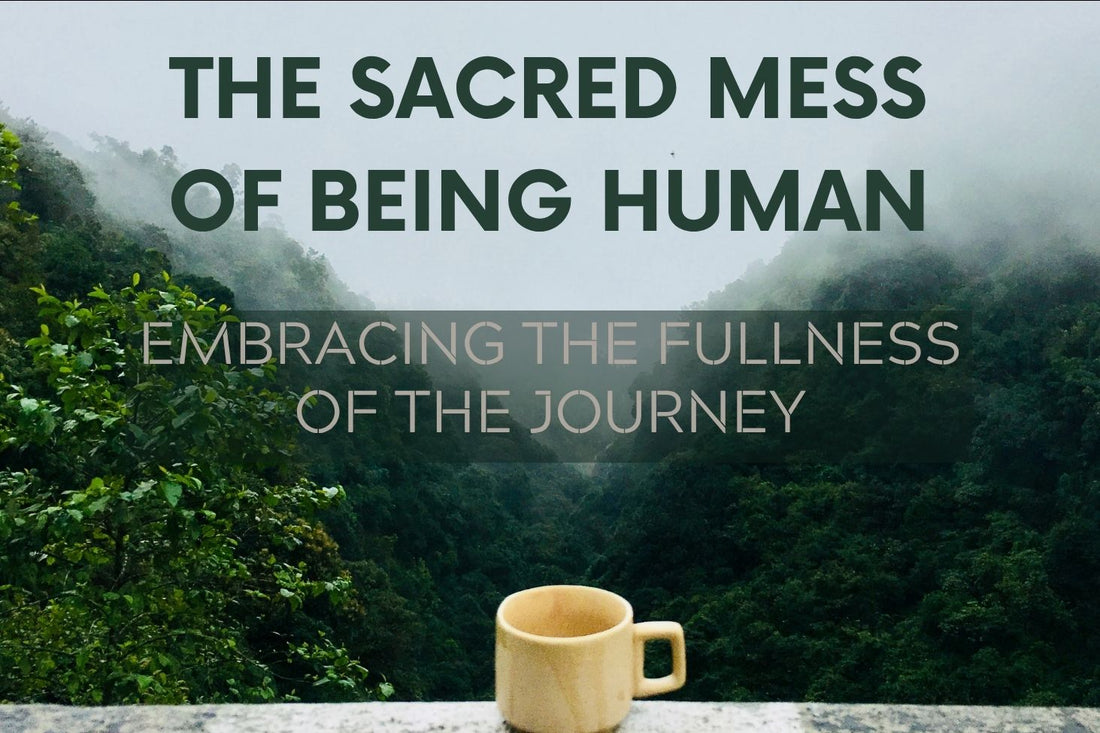
The Sacred Mess of Being Human: Embracing the Fullness of Your Journey
Share
Let’s be honest! The human experience is messy, magical, unpredictable, and deeply meaningful at the same time. It’s a rollercoaster of emotions, lessons, connections, and soul growth. Some days bring belly laughs, while others leave you wondering how you’ll make it through the next hour. But through it all, there’s something sacred unfolding. Every moment—no matter how chaotic, painful, or beautiful—is shaping who you’re becoming.
In this blog, we’ll explore what it truly means to be human—not just from a practical or emotional perspective, but from a spiritual one. We’ll talk about why your emotions matter, how vulnerability can become your superpower, and why even your hardest moments hold spiritual gold. Most importantly, we’ll reflect on the truth that being human isn’t something to fix—it’s something to fully feel.
Understanding the Human Experience
Being human means living in a body, thinking thoughts, feeling feelings, and having experiences that stretch you in all directions. It’s waking up with dreams, facing heartbreak, finding love, losing yourself, and rediscovering who you are—again and again.
Your human experience is uniquely yours—a path shaped by your upbringing, beliefs, environment, and the soul lessons you came here to learn. It includes moments that break you and moments that remake you. From a spiritual lens, every experience you go through—good or bad—is part of your soul’s evolution. Nothing is wasted. Even detours have purpose.
Embracing Every Emotion
In a world that often demands emotional perfection, it’s easy to believe some feelings are “bad” or should be pushed away. But emotions aren’t problems to solve—they’re messengers. Joy, grief, anger, love, fear—each carries wisdom. They show you what matters, what hurts, what needs healing, and what lights you up.
Spiritually speaking, emotions are energy in motion. Suppressing them blocks your energy and disconnects you from your true self. But allowing yourself to really feel—that’s how you reclaim your power. It’s okay to be angry. It’s okay to cry. It’s okay to feel numb sometimes. What’s not okay is pretending you’re fine when your soul is begging you to feel.
Let yourself experience your emotions without judgment. They’re part of the divine design of being human.
The Necessity of Vulnerability
We’re conditioned to armor up—to hide our fears, mask our pain, and show only polished versions of ourselves. But the truth is, vulnerability is where real magic lives. It’s the gateway to intimacy, self-acceptance, and healing.
When you let down your guard and allow others to see the real you—the messy, raw, beautiful, hurting, healing you—you open space for connection. Not just with others, but with your own soul.
Vulnerability invites deeper connections. Sharing your true self, flaws and all, fosters empathy and compassion, creating meaningful relationships. It also opens the door to growth and self-discovery. Spiritually, vulnerability is surrender. It says, I trust life. I trust myself. I don’t need to have it all figured out to be worthy of love.
Overcoming Challenges and Adversity
Let’s be real: life will test you. You’ll face heartbreak, disappointment, failure, grief. But those moments? They’re sacred invitations. They wake you up, burn away illusions, and strip you down to your core truth.
Spiritually, adversity isn’t punishment. It’s a classroom. Challenges stretch your capacity to grow. They teach resilience, compassion, faith, and perspective. When you meet struggles with curiosity instead of resistance, they become portals to transformation.
You don’t have to be strong all the time. But every time you get back up, you’re turning pain into power.
Connection and Empathy
Humans aren’t meant to walk this journey alone. We crave connection, being seen, heard, and understood. This longing is divine and reflects our inner knowing that we’re all deeply interconnected.
Empathy bridges this connection. When you take time to understand someone else’s pain or joy, you create sacred space. Not just for them, but for yourself. Being human isn’t a solo mission. We rise when we remember we belong to each other. Every act of compassion, presence, or forgiveness honors the collective soul of humanity.
Spiritual Lessons of the Human Experience
Here’s the deeper truth: You’re not just a human having a spiritual experience, you’re a spirit having a human experience. Your soul chose to be here, to learn, love, lose, and grow. The messiness of life isn’t a mistake; it’s part of the agreement.
Some days you’ll feel lost, but your soul always knows the way home. Every time you allow yourself to feel, connect, slow down, and reflect, you honor your divine path. Let your humanness be sacred. Let your breakdowns become breakthroughs. Let your everyday life be your ritual.
Let It Be Fully Human and Fully Sacred
The human experience isn’t a problem to fix, it’s a life to feel. Walking this earth, with all its heartbreak and beauty, is a holy act. So give yourself permission to show up as you are. Feel it all. Laugh loudly. Cry unapologetically. Grow slowly. Love deeply. Remember, your soul didn’t come here to be perfect. It came here to be real.
If you’re ready to deepen your connection to your inner world and support your journey with intention, explore our chakra healing journals and self-affirmation candles. Each one is lovingly created to guide your healing, balance your energy, and remind you of the sacredness in simply being human. Let your healing be a ceremony. Let your daily life be your spiritual practice.
You’re not alone on this journey and you were never meant to be.
